- Home
- Joseph Bruchac
Sacajawea Page 8
Sacajawea Read online
Page 8
The next morning we saw the tracks where it had come out of the river. It had climbed right over the big white boat, stepping into it as it went and badly damaging the rifle that belonged to York. Captain Clark spoke hard words to him about leaving his weapon in the boat, and York was unhappy all through that day. Captain Lewis kept walking around the white boat, speaking to himself and shaking his head.
"What is he saying?" I asked your father.
"He thinks that the big white boat has a bad spirit with it," Charbonneau said. "And he is right. This devil boat has already tried to kill me twice."
But I could not agree. Though the buffalo had run through our camp, its feet striking the earth right next to the heads of the sleeping men, no one had been injured. All that was hurt was the gun, and the blacksmith would soon fix that. It seemed to me as if good spirits were with the two captains, protecting them along their way. As difficult as our journey would be, I was certain those good spirits would help us succeed.
Soon we passed the River That Scolds All Others. That is how the Indians call it. But the captains gave it a different name. They called it the Milk River. That was something they did everywhere, Firstborn Son. Even though we came to places that already had names, they gave those places new names. It would have been hard for them to remember those new names, had they not made their marks on the white leaves.
Just after we passed the wide river the Minnetarees call the Musselshell, we came to a smaller river, one that flowed strong with clear water. The two captains both looked at me that day as they made marks in their books. That river, they told me, now shared my name. It was now Bird Woman's River. I felt something then. I still cannot tell you whether I was proud, but I was touched that they had done this. It was strange to leave a part of myself with that river.
***
We came now to a country where the Minnetarees never traveled. They always cut across the plain on horses after the River That Scolds All Others. But with our boats, we had to stay in the water. I was glad to not be on the shore. There was great danger there. There were more dead buffalo along the river's banks, and even more bears. When he was out with Drouillard, your father was almost caught by one of those bears.
"I will be the one to kill this bear," Charbonneau said to Drouillard. But when it charged at him, your father fired his gun into the air and ran. "Mon Dieu," your father shouted, "have mercy on me!"
While the bear tried to find him, your father hid in the bushes. At last Drouillard was able to shoot the bear in the head and kill it.
***
All along the river great white cliffs rose. The rocks lifted up in strange, beautiful shapes. I thought they looked like the lodges of powerful beings. It seemed to me as if there were many stories in those stones. The river was twisting now like a snake, and there were stones everywhere. The men had to climb out and pull the boats with ropes, and the ropes kept breaking. As before, the big white boat was the one that caused the most trouble. It was as if that place did not wish us to pass through. Perhaps it was the medicine of that place that made me become ill. I told your father that I was not feeling well, that a pain was growing in my stomach. He ignored me. He was trying hard not to attract the attention of the captains for fear they would make him climb out of the big white boat and pull on those ropes.
The captains were excited, despite the difficulty of the river. They had finally seen the tallest mountains, where our Numi people live. Soon they would come to the Great Falls, and then the mountains would be close. So the Minnetarees had assured them. But then something happened. The river that had been one stream became two. Two rivers flowed together to become the Great Muddy. Which of them came from the Great Falls?
I could not help them. I had never been to this place before.
"I do not know which river is the one to follow," I said, and your father translated my words. Then I clutched my stomach. The pain was growing worse.
Captain Clark looked at me with concern.
"It is nothing," your father said, trying to convince himself as much as the captains. "It is a woman's illness. Ma petite Bird Woman, she will be well soon."
I waved them away from me, not wanting to add to their troubles. Then, though Captain Clark continued to glance over at me, the discussion went on. Everyone talked long and hard. Scouting parties were sent up both rivers. At last almost everyone was certain. The Missouri was the deeper, swifter river, the muddy one that came from the north. Only two people disagreed. Those two were Captain Clark and Captain Lewis. The bed of the river to the west was made of stones, like that of a river coming from the mountains. So that was the river that came from the Great Falls. Everyone was sure they were wrong. But because they were the captains, everyone agreed to follow them.
Once again the good spirits were with our captains. The river from the west was the right one. Captain Lewis scouted ahead. After only a few days he came to the Great Falls. But he saw that there was still much difficulty ahead. For there was not just one set of falls, but many. The boats and all their things would have to be taken across the rocky land filled with cactus until the river ran smooth again, above the many falls. It would be a hard, hard journey of many days.
He hurried back to tell the others of his discovery. While he was gone, I had grown sicker. Though Captain Clark tried to release the spirits of my sickness from my body by cutting my legs and making me bleed, nothing had helped. My arms and hands trembled, my eyes saw only darkness. I was certain that I would soon die.
16. WILLIAM CLARK
The Great Falls
June 16th of Sunday 1805
the wind roared from the S.W. hard and Some rain at about 2 oClock Capt Lewis joined me from the falls 5 miles distant & infd. that the Lord Side was the best portage I despatched 2 men on the Lard. Side to examine the portage.—the Indian woman verry bad, & will take no medisin what ever, untill her husband finding her out of her Senses, easyly provailed on her to take medison, if She dies it will be the fault of the husband as I am now convinced—.
JOURNAL OF WILLIAM CLARK
GREAT FALLS, MONTANA
I FEAR THAT I did little good helping your mother when she was ill, Pomp. Though each of us on our great voyage of discovery had to know something of doctoring, I was better at such things as the mending of broken bones or the sewing up of a wound. When it came to real illness, it was Captain Lewis who served as our physician. And no doctor could ever have cared better for a patient than Meri did for our Janey. As soon as he returned from the Great Falls he rushed to her. I told him what I had done as he checked her pulse and found it scarcely perceptible. Charbonneau hovered over him, wringing his hands. Neglectful as he might have been of your mother before her condition became so grave, your father never left her side all the time she was ill, and he would eat or drink nothing until she was well.
Captain Lewis lowered his head in thought, it seemed, biting his lower lip as he did so. Though it could have been no more than a minute or two, it seemed an eternity to your father and me. At that moment I was certain he would raise his head, shake it, and say that there was no hope. But in those days Captain Meriwether Lewis was not a man to give in to his despair, not while there was still a continent to cross. He looked over at Charbonneau and me and nodded his head with that old certainty of his.
"Billy," he said, "remember the sulfur spring we found on the other side of the river? Its water in all appearance is precisely similar to that of Bowyer's Spring in Virginia. I'm resolved that we must try its virtue on her."
Then he sent a man to bring back some of that water while I helped make ready for the great portage we would soon begin. In the meantime he began giving her doses of Peruvian bark and laudanum. Slowly her pulse became steadier and stronger. All through that day he continued to treat her. He made her drink the water of the spring and gave her more of his medicines. By that evening a gentle perspiration had come on and her illness much abated. By the next day she was free of pain, clear of fever, and eating a
s freely as Meri would permit her of broiled buffalo well seasoned with pepper and salt. He had brought her back almost from the dead.
"You have done a fine thing, Meri," I said to him.
"What else could I do?" he answered. "She being our only dependence for a friendly negotiation with the Snake Indians."
And that was how Captain Lewis was, practical and clear minded. But I knew that he was almost as fond as I of your mother and you. Yes, and even of your father, old Charbonneau, with his thousand faults. The health and well-being of your little family meant almost as much to us by then as did our success in the great endeavor.
During Meri's doctoring of your mother, I was overseeing all else that had to be done. We had already hidden the larger of our two boats, the red one, and continued toward the Great Falls in the white pirogue, despite its many misfortunes. Cruzatte had showed us how to make a cache, and in it we stored quantities of food and gunpowder and other supplies we would need on our return journey. Now we saw that we must also leave the white pirogue behind. We hid it in the middle of a small island in the north fork. Our portage of more than twelve miles around the falls and rapids would be arduous. We had to travel as light as we could and yet take with us all that was needed.
One of the things, indeed the heaviest, was the bulky framework of an iron boat that Captain Lewis was fond of. That boat was, I must admit, the oldest of his companions on the journey. It had been with him long before I was. He had invented it himself and brought it all the way from Harper's Ferry. Our men referred to it as the Experiment, and had lugged it without complaint, even though the general thought was that it would fail. Without a word, your mother had summed up the opinion of all save Captain Lewis. Upon being told what the heavy metal frame was for, she reached out a hand to touch a large rock, pointed at the river and then let her hand fall quickly, as if sinking like a stone.
Captain Lewis, though, had no doubts. When we reached the other side of our portage, we would assemble the frame of the boat, cover it with the twenty-eight elk skins and two buffalo skins we had prepared, caulk it with pine pitch, and then float away. Or so Meri expected. While we did the portage he would ready his miraculous vessel.
"My boat," he said "will easily hold eight thousand pounds, and when unloaded can be carried by only eight men with the greatest of ease."
Eight men, I thought. And I resolved to keep my eyes open for groves of cottonwood trees that could be made into dugout canoes when the great boat experiment failed.
The distance was too far for us to carry everything on our shoulders. We made four sets of truck wheels from the only cottonwood tree in sight within twenty miles. The mast of the white pirogue was cut down and sawed into axles. With coupling, tongues, and bodies, we could use those wheels to draw our canoes and baggage along on the portage. I went and surveyed the route we would take. At last, just after sunrise on June 22, we began the portage. By then your mother was quite recovered. She was walking about and fishing in the river!
That ten-day portage around the Great Falls was the hardest we made. The prickly pears stuck our feet through our moccasins. The axle trees and tongues of our wheels broke down as they followed the route I had staked out. So many buffalo had trodden the earth that it was uneven and worse than frozen ground. The men had to catch at grass and knobs and stones to draw the canoes and loads. The mosquitoes were extremely troublesome, as were large black gnats that did not sting but swarmed about us and filled our eyes.
Your mother kept your head covered with her blanket to protect your eyes, but her own were never closed. She was constantly on watch and warning us of danger, which was there in plenty. The great white bears were now more numerous than ever before. They followed us as we pulled our loads, coming so close we thought they would surely attack. They were so many that we did not dare to send one man alone out on any errand, particularly if he had to pass through the brush. Each night the bears would come around our camp. Captain Lewis's great dog, Seaman, was awake all through those nights. Patrolling back and forth, he gave us timely notice of the bears' visits. Had he not been there, the white bears surely would have ventured to attack. It seemed that there was no end of difficulty and danger to be had as we struggled our way toward the White Bear Islands camp, where Meri was now engaged in the long task of assembling the Experiment.
It was near the end of that hard portage, on Saturday, June 29, that a series of sudden heavy rains began to fall. Those rains, my lad, almost ended your life.
17. SACAJAWEA
Flash Flood
Long ago, a man and his wife were fishing in the river. He had waded deep into the water, using his spear to catch fish. Each time he speared a fish he would throw it back to his wife on the shore, and she would place it into her basket. But then as that man thrust at a large fish, he lost his footing and fell into the swift current. As it swept him away, his wife jumped into the deep water after him. She pushed him toward shore, and he was able to climb out of the water. But when he turned to pull his wife out, she was gone. She had given her life to save him.
That man was sick for a long time. He did not know if he wanted to keep on living. But when he was well enough to return at last to that river, a shape lifted up in the mist near the falls. It was the spirit of his wife.
"Do not be sad," his wife's spirit said. "I will always be here to warn my people of the danger. Now I will always be able to help others. I am happy here."
YOU WANT TO HEAR about the day of the flood? How your good uncle saved our lives? It was a few more than two handfuls of days after Captain Lewis saved my life with his medicine. I felt so well that I was able to accompany your father and your good uncle as they walked along the trail that we had to take to get around the many falls. In fact, I think your good uncle wanted me to be with them. It seemed as if he was always watching over me, in much the same way as I watched over you, Firstborn Son.
The strong winds and rains had come, those winds and rains that come to our land during the Moons of Long Days. That morning the ground was so wet from one such rain that the men were not able to push the boats on wheels any farther. Captain Clark had lost some of the talking leaves on which he had made marks about the path they were to travel. So he decided to walk back that way, along the river between two of the waterfalls. York, your father, and I—and you, in your cradleboard—were the only ones with him.
As we walked along a deep ravine, York saw buffalo in the distance. He looked over at your good uncle.
Captain Clark smiled. He knew how much York loved to hunt. "Go ahead," he said. "It would be good to have the hump and tongue of a fat buffalo."
We walked on only a little way farther before the wind came. It howled around the stones like a great wolf, and it almost knocked us down upon the ground. With it came the drumbeat of hail. The hail had not reached us yet, but we could see it coming across the green earth of the plain. The hail was striking with such force that it tore up the earth as it came. Your father, Charbonneau, did as he usually does when threatened by danger. He stared at the hailstorm as it thudded closer.
Your good uncle saw what danger we were in. The wind was so strong that it might throw us from the cliff and into the river. The balls of hail were as large as my fists, big enough to injure or even kill a person. We had to find shelter.
"There!" Captain Clark shouted over the howling of the wind, pointing at a shelving rock near the bottom of the ravine.
He cradled his rifle in his arm as he pushed me ahead of him with his elbow. I held your cradleboard tight and reached out my other hand to grasp your father's sleeve, pulling him with us as we scrambled down the slope.
There, on the upper side of the ravine, the ledge of stone sheltered us well from the wind. The hail rattled over us, great balls of ice exploding onto the stones of the ravine. But we stayed safe and dry beneath the shelf of stone. I loosened you from your cradleboard and held you close to me. Captain Clark and your father placed their guns, their powder horns, and their oth
er things down by their sides as they sat. To keep himself busy, your father started to clean his gun with the wiping rod he had borrowed earlier that day from Captain Lewis.
The rain was still falling, but the rattling of the hail had ended. Your good uncle and your father were enjoying being safe from the power of the storm. But I was worried. Something was not right. A deeper sound, like the growling of a great, distant bear, was making itself heard.
"Listen!" I shouted as I reached out to shake your good uncle's shoulder. He peered out from our shelter to look up the ravine. We both saw it coming toward us. It was a flash flood.
Great boulders were being pushed in front of it as if they were birds' eggs. If the flood struck us it would carry us downstream to sweep us over the Great Falls. There we would surely be killed, if we were not first drowned.
Your good uncle did not hesitate. As always, he knew just what to do. He pushed your father out of our shelter ahead of him. He grabbed his rifle and shot pouch with his left hand and thrust me up the loose stones of the slope with his other hand. I had no time to put you back into your cradleboard. I just held you tight as Captain Clark tried to save our lives from the flood. The rushing waters had already risen up to his waist, pulling at him as a mountain lion pulls at the haunches of a deer struggling to escape.

 Peacemaker
Peacemaker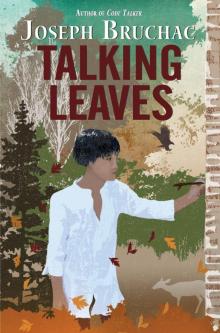 Talking Leaves
Talking Leaves Found
Found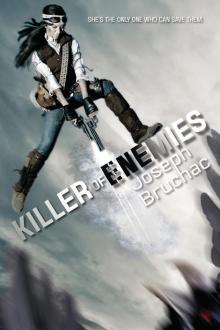 Killer of Enemies
Killer of Enemies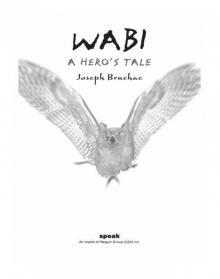 Wabi
Wabi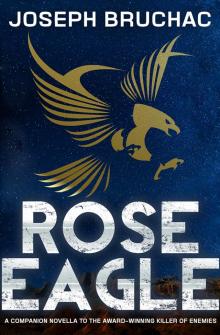 Rose Eagle
Rose Eagle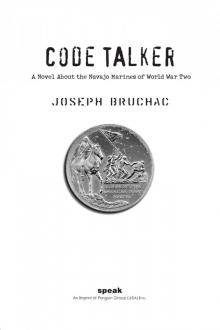 Code Talker
Code Talker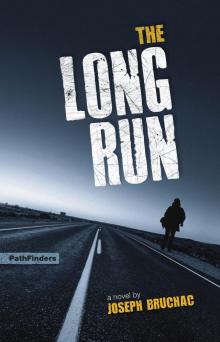 The Long Run
The Long Run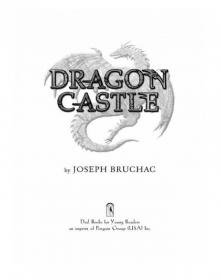 Dragon Castle
Dragon Castle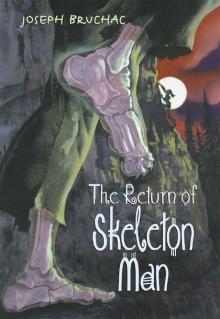 The Return of Skeleton Man
The Return of Skeleton Man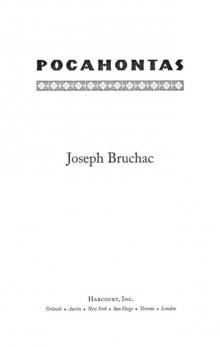 Pocahontas
Pocahontas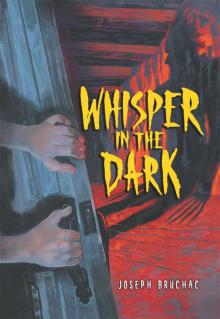 Whisper in the Dark
Whisper in the Dark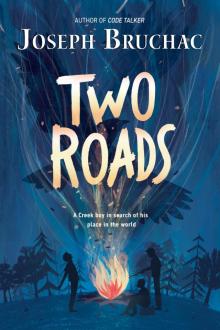 Two Roads
Two Roads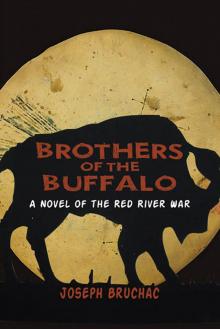 Brothers of the Buffalo
Brothers of the Buffalo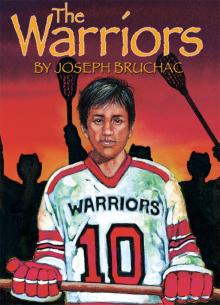 The Warriors
The Warriors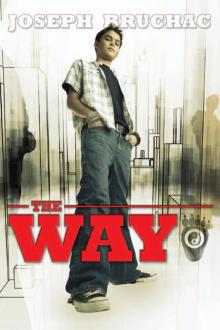 The Way
The Way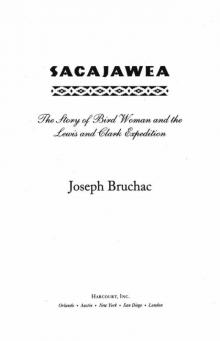 Sacajawea
Sacajawea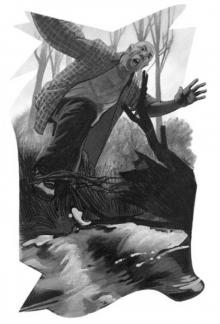 Night Wings
Night Wings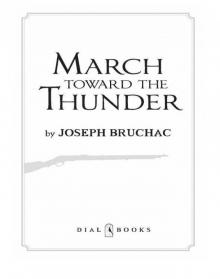 March Toward the Thunder
March Toward the Thunder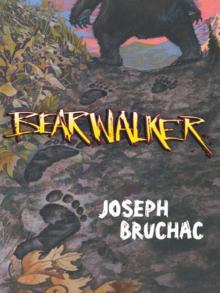 Bearwalker
Bearwalker Skeleton Man
Skeleton Man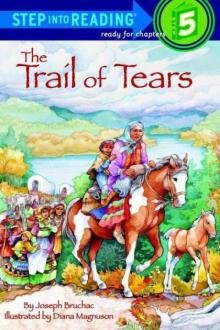 The Trail of Tears
The Trail of Tears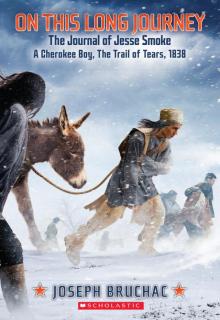 On This Long Journey
On This Long Journey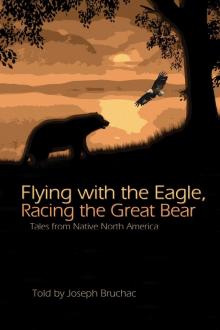 Flying with the Eagle, Racing the Great Bear
Flying with the Eagle, Racing the Great Bear